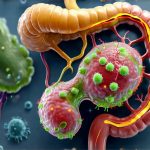When our bodies battle a viral illness like the flu, a common cold, or even a more significant infection, the immune system rightfully takes center stage. It directs resources, mobilizes defenses, and works tirelessly to eliminate the threat. However, this intense activity often comes at a cost, particularly for our gut health. The gastrointestinal tract isn’t just responsible for digestion; it’s a critical component of immunity itself, hosting a vast ecosystem of microorganisms – the gut microbiome – that plays an essential role in modulating immune responses and maintaining overall wellbeing. A viral illness can disrupt this delicate balance, leading to inflammation, altered gut motility, and potential damage to the intestinal lining.
The aftermath of such illnesses frequently involves lingering digestive issues like bloating, diarrhea, constipation, or nausea, even after the acute symptoms subside. These aren’t merely inconveniences; they signal a disruption in gut function that can impact nutrient absorption, energy levels, mood, and long-term health. Supporting gut recovery is therefore paramount for restoring overall vitality and preventing potential complications. It’s about more than just ‘waiting it out’; it’s about proactively nurturing the gut back to its optimal state using targeted strategies focused on reducing inflammation, repopulating beneficial bacteria, and strengthening the intestinal barrier. This process requires a holistic approach that considers diet, lifestyle, and potentially specific supplementation, always in consultation with a healthcare professional. If you’re dealing with recurring issues, consider how to support a child experiencing similar symptoms.
Dietary Strategies for Gut Healing
The food we consume plays an absolutely central role in gut recovery. During and immediately after illness, the digestive system is often compromised, making it more sensitive to certain foods. Prioritizing easily digestible options and minimizing inflammatory triggers are key first steps. This means temporarily reducing or eliminating common irritants such as processed foods, refined sugars, excessive caffeine, alcohol, and potentially dairy (if you’re lactose intolerant or find it exacerbates symptoms). A focus on whole, unprocessed foods provides the building blocks for repair while minimizing stress on the digestive system.
A cornerstone of gut recovery is incorporating foods rich in prebiotic fiber. Prebiotics aren’t digested themselves but serve as food for beneficial bacteria in the colon, encouraging their growth and diversity. Excellent sources include: – Garlic – Onions – Leeks – Asparagus – Bananas (slightly green are best) – Oats – Apples (with skin) – in moderation During this recovery period, consider a temporary reduction in high-fiber foods if experiencing diarrhea, gradually reintroducing them as tolerance improves. The goal is to gently stimulate gut motility without overwhelming the system. You can learn how to build a recovery meal after indigestion to help with this process.
Furthermore, including fermented foods can help repopulate the gut with beneficial bacteria. These provide probiotics – live microorganisms that contribute to a healthy microbiome. Options include: – Yogurt (unsweetened, with live cultures) – Kefir – Sauerkraut (unpasteurized) – Kimchi – Kombucha (low sugar) Introducing fermented foods slowly and observing your body’s response is important, as some individuals may experience temporary digestive upset initially. Remember that dietary needs are individual; what works for one person might not work for another. Paying attention to how your body responds to different foods is crucial during this process.
Rebuilding the Gut Microbiome
The gut microbiome is often significantly altered by viral infections and the subsequent immune response. Antibiotics, sometimes used to treat secondary bacterial infections following a viral illness, can further disrupt the delicate balance of gut bacteria. Therefore, supporting microbiome restoration is vital for long-term gut health. While dietary strategies are foundational, targeted probiotic supplementation may be considered under the guidance of a healthcare professional. It’s important to remember that not all probiotics are created equal; different strains have different effects and suitability varies based on individual needs and conditions.
Choosing a high-quality probiotic with diverse strains and sufficient CFUs (colony forming units) is essential. Look for products from reputable brands that guarantee potency through the expiration date. A healthcare professional can help determine which strains are most appropriate based on your specific situation and symptoms. It’s also important to understand that probiotics aren’t a quick fix; consistency is key. Taking them regularly, as directed, is more beneficial than sporadic use. Beyond probiotic supplementation, prebiotic-rich foods continue to play a crucial role in feeding the existing and newly introduced beneficial bacteria. If you are recovering from illness, supporting gut healing is essential for long term health.
The gut microbiome isn’t just about bacteria either. It includes fungi, viruses, and other microorganisms. Supporting overall microbial diversity is increasingly recognized as important for resilience and optimal function. Focusing on a varied diet with plenty of plant-based foods helps to nurture this complexity. Furthermore, minimizing factors that negatively impact the microbiome – such as chronic stress, poor sleep, and excessive antibiotic use – are critical for long-term gut health.
Reducing Inflammation & Strengthening Gut Barrier
Inflammation is a natural part of the immune response but can become problematic when it’s chronic or excessive. Viral illnesses often trigger significant inflammation in the gut, contributing to symptoms like diarrhea and abdominal pain. Reducing inflammatory triggers through diet and lifestyle adjustments is essential for promoting healing. This involves prioritizing anti-inflammatory foods such as: – Fatty fish (salmon, mackerel) – Berries – Leafy green vegetables – Turmeric – can be used in cooking or taken as a supplement (with black pepper to enhance absorption).
A key aspect of gut recovery is strengthening the intestinal barrier – the protective lining of the digestive tract. When this barrier becomes compromised (“leaky gut”), it allows undigested food particles, toxins, and bacteria to enter the bloodstream, triggering immune activation and inflammation. Certain nutrients play a vital role in supporting intestinal barrier integrity. L-glutamine, an amino acid, is often used to help repair damaged cells within the intestinal lining, although supplementation should be discussed with a healthcare professional.
Stress management techniques are also incredibly important for gut health. Chronic stress can negatively impact gut motility, increase inflammation, and compromise the intestinal barrier. Incorporating practices like mindfulness meditation, yoga, deep breathing exercises, or spending time in nature can help reduce stress levels and support overall wellbeing. Prioritizing sufficient sleep is another critical factor, as sleep deprivation can exacerbate inflammation and disrupt gut function. How to reset your gut after overeating can also help with recovery. Consider a recovery plan if you’ve experienced food poisoning, nausea, or the stomach flu. Finally, when recovering from a bug, it’s helpful to eat safely and carefully reintroduce foods.


















